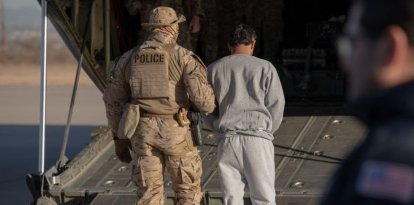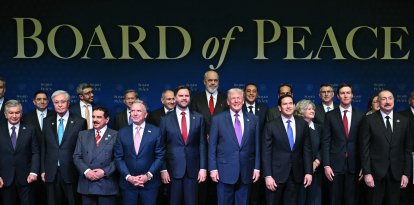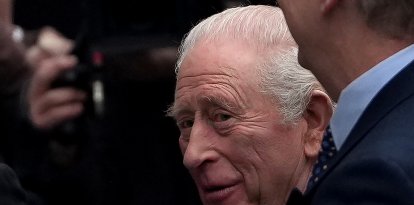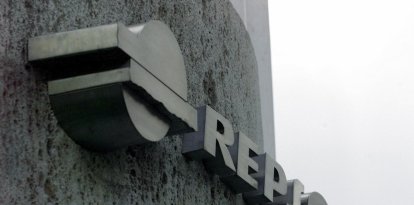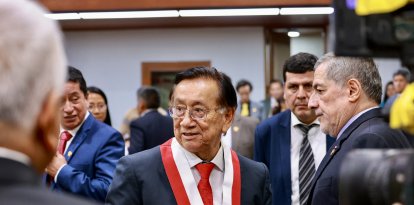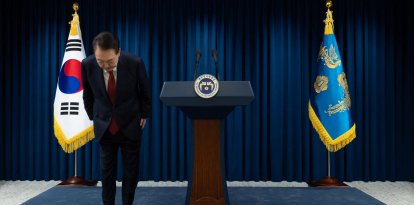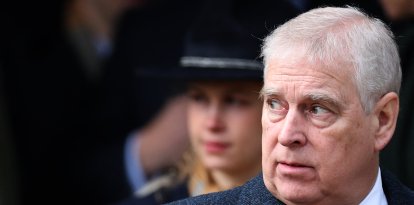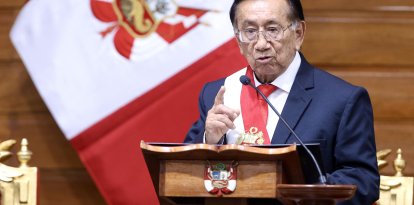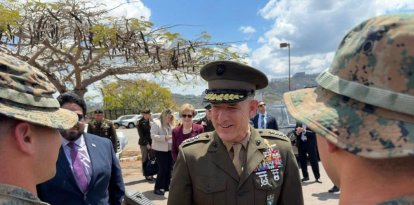From establishing himself as one of Maduro's most powerful men to being paraded as a trophy: Who is Tareck El Aissami?
Accused and wanted for drug trafficking by the United States, he was a long-time senior member of Nicolás Maduro's dictatorship.
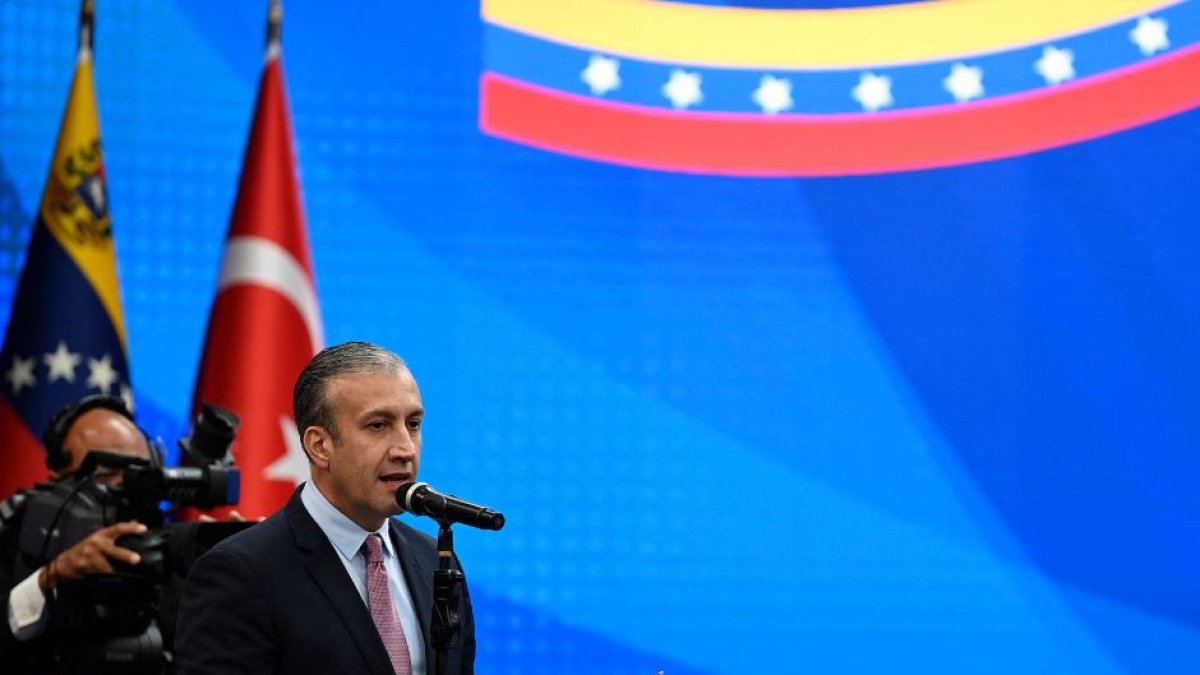
En imagen, el exvicepresidente y exministro Tareck El Aissami (AFP)
This Tuesday, the Public Ministry of Venezuela, headed by the attorney general of the Nicolás Maduro regime, Tarek William Saab, suddenly announced the arrest of an influential Chavista leader who became vice president of Venezuela, president of PDVSA (the state oil company) and Minister of Petroleum.
Accusations were filed against El Aissami after he disappeared for more than a year and resigned from his last position as minister. He is specifically accused of embezzling $23 billion from Venezuelan oil sales.
“We have managed to reveal the direct participation and consequent arrest of Tareck El Aissami, detained to be presented and charged by the Public Ministry in the next few hours,” Saab reported in a statement to the press. “The objective of this mafia, headed by Tareck El Aissami, was none other than to implode the national economy, destroy our currency by pushing up the parallel dollar and make the economic policies promoted by the Executive fail.”
Saab did not spare anything at the press conference. Not even the insults. A fact that never ceases to surprise because El Aissami became a man of absolute trust for the dictator Nicolás Maduro and his predecessor, the late Hugo Chávez.
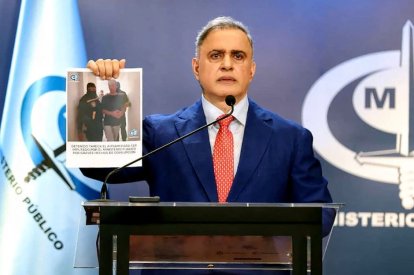
Tarek William Saab announces arrest of Tarek El Aissami
Venezuela’s Attorney General, Tarek William Saab, shows a photo of Tareck El Aissami being detained. (AFP/Office of the Attorney General in Venezuela)
In 2019, when the United States Justice Department constantly investigated El Aissami, Maduro publicly defended him, recalling the disgraced former minister’s Lebanese and working-class origins.
“The United States government keeps attacking Tarek El Aissami because he is the son of an Arab couple, an Arab father, an Arab mother from a family that is partly in Syria and partly in Lebanon, a hard-working family, with honest people, patriotic people, humanistic people,” said Maduro. “The State Department and the traitors who have gone there to serve the American empire attack him because he is a brave man, who is priceless, a true patriot, revolutionary, a socialist. They want to link him to Hezbollah. I know Tarek well, I know him very well.”
The news about his arrest comes just one day after former Venezuelan general Clíver Alcalá was sentenced in New York to 21 years in prison for providing weapons to the Colombian Armed Revolutionary Forces (FARC), a Colombian guerrilla group that operates in Venezuela and Colombia.
El Aissami was not just another name within the criminal structure of the Maduro regime. In fact, until a year ago, after his resignation and disappearance, he was still one of the most powerful since he retained his power over the Ministry of Petroleum, one of the most critical positions in the Venezuelan cabinet.
But El Aissami was not only relevant for being the head of a powerful ministry but also for his international influence, being the key link between the Maduro dictatorship and the terrorist organization Hezbollah.
In fact, due to his links to drug trafficking and transnational crime, he was part of the most wanted list in the United States, which named the former minister for drug trafficking in 2017.
The United States Immigration and Customs Enforcement (ICE) described it as such: “In February 2017, the Office of Foreign Assets Control (OFAC) of the United States Department of the Treasury designated Tareck Zaidan El Aissami, a Venezuelan national, as a Specially Designated Drug Trafficker (SDNT) pursuant to the Foreign Narcotics Kingpin Designation Act for playing a significant role in international drug trafficking.”
“He facilitated narcotics shipments from Venezuela, including control of planes that left a Venezuelan air base and drug routes through ports in Venezuela. In his former positions, he supervised or partially owned narcotics shipments of more than 1,000 kilograms from Venezuela on multiple occasions, including those with Mexico and the United States as final destinations,” the immigration agency described.
To establish yourself as one of the... by emmanuel.rondon
In 2019, El Aissami became the second official in the Maduro regime to be charged by the United States for violating sanctions imposed by Washington for his ties to drug trafficking.
The Federal Prosecutor’s Office in Manhattan announced at that time that the official avoided the restrictions imposed by the United States by traveling to Russia and Turkey on private jets provided by American companies. El Aissami was charged with five counts, representing a maximum total of 150 years in prison. Washington also offered $10 million for information leading to his arrest.
At that time, the United States also charged Samark José López Bello, accused of being El Aissami’s frontman.
In addition to his accusations in the United States, the former minister was the key man in the entire reform of the Venezuelan prison system, which directly caused the formation of the figure of “El Pran,” a hierarchical criminal figure within Venezuela who represents leadership within the South American country’s prisons.
El Aissami was also an essential piece of Venezuela’s foreign policy, being one of the figures who gave meaning to the intimate link of the Maduro regime with Iran and Syria and one of those responsible for the rapprochement of Caracas with Turkey.
El Aissami is the highest-ranking Chavista leader to be detained by his own system. This event takes place in a delicate political context in the South American country, which is on the verge of a presidential “election” questioned by the lack of guarantees and the bloody persecution of political dissidence.
El Aissami’s political and criminal cover letter
The career of the powerful Chavista Oil Minister in Venezuela is lengthy and important. He started, in fact, from the bottom until he practically occupied two of the most critical positions in the South American country.
After graduating in Law and Criminology from the University of Los Andes (ULA), one of the most important universities in the Venezuelan interior, he began working in 2003 in public administration as the first head of the Identity Mission, a program created under the Administration of Nicolás Maduro’s predecessor, the late Hugo Chávez. Two years later, he ran for parliamentary elections and won a seat for the state of Mérida. There, he began his substantial rise within the Chavista system, becoming an essential figure.
In January 2007, he left his deputy position and took up the vice ministry of Prevention and Citizen Security. A year and a half later, El Aissami’s rise was meteoric, becoming Minister of the Interior and Justice, a position he held until October 2012, the same month in which Chávez had been reelected as president months after his official death in 2013.
According to the organization Insight Crime, as Minister of the Interior and Justice, El Aissami was one of the architects of the destruction of the Venezuelan security system and the main promoter of the criminal unrest that has subdued the South American country for more than a decade.
First, El Aissami created the Bolivarian National Police (PNB) in 2009, which basically took away strength and power from state security agencies, especially those belonging to the governorates and mayors’ offices where the opposition to the Chávez regime ruled. Since then, the data has been clear: crime increased in the capital, Caracas, and other cities in the country’s interior.
In short, under El Aissami’s management, Venezuela became one of the most insecure countries on the planet.
The former minister ordered substantial modifications to the penitentiary system that led to the appearance of a new figure of power in Venezuelan prisons: “El Pran.”
El Aissami ordered the relaxation of the rules for visiting prisons, which encouraged the regular entry of goods and services to these institutions, encouraging the establishment of illegal economies within the prisons. This led to the emergence of the “pranatos,” led by the “Pranes.”
“The Pranes, prisoners with greater power and subordinate men, began to charge a tax for everything that entered the prison. Food businesses, barbershops, and commercial establishments also began to pay a pran tax, which added more and more power, until it transcended the walls of the prison,” Insight Crime explains. “Both children and wives, as well as sex workers, drugs and alcohol, began to enter the facilities more freely, and the criminal gangs established in the prison replicated their organization outside the prisons.”
In 2012, the already controversial minister El Aissami —who was linked to major drug traffickers like Walid Makled, a powerful criminal turned informant who was sentenced in 2015 to fourteen years in prison in Venezuela for drug trafficking and money laundering—left his position and was elected governor of the state of Aragua, the region where the dangerous gang “El Tren de Aragua” emerged.
The Tren de Aragua is one of the fastest-growing criminal organizations in the world and has already begun to manifest a presence in some important cities in the United States, such as Chicago and New York.
According to the Insight Crime report, the growth of the Tren de Aragua and the rise of El Aissami as governor is no coincidence. As leader of that state, the senior leader of Chavismo obstructed the efforts of local police to dismantle the group. Likewise, it allowed the closure of the police station in the San Vicente neighborhood, an area taken over by the criminal group where an operations center was established under the complicit gaze of the authorities.
“A report from Transparencia Venezuela alleges that El Aissami was also involved in the transfer of prisoners from the Tocorón prison to the state of Sucre in 2018 so that the Tren [de Aragua] could dispute control of the drug route with local gangs,” the organization also points out.
Tareck El Aissami’s links to transnational crime and a hint at his fall from grace
An investigation by The New York Times in 2019 revealed a surprising fact. Tareck El Aissami, who had been vice president of Venezuela between 2017 and 2018, was not only being investigated by the State Department but also by Venezuelan intelligence.
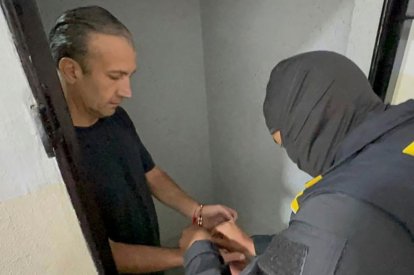
The arrest of Tareck El Aissami
Tareck El Aissami detained by Venezuelan authorities. (AFP - Office of the Attorney General in Venezuela)
According to the NYT, El Aissami and his father, Carlos Zaidan El Aissami, a Syrian migrant who once worked with Hezbollah during visits to his native country, helped militants of the terrorist organization sneak into Venezuela to train them in their efforts to expand spy networks throughout Latin America.
The idea, according to documents from the Venezuelan Intelligence Agency cited by the Times, was also to start working and strengthening drug routes to finance the terrorist group.
In these documents, the links of El Aissami and his family with the disgraced drug trafficker Walid Makled were also established.
In addition, the media reports that the documents mention that El Aissami kept 140 tons of chemicals that are believed to have been used for the production of cocaine, a business that led the former minister to amass a great fortune while Venezuela was going through a severe economic crisis.
“Using a frontman currently under sanctions by the United States, Mr. El Aissami bought an American bank, parts of a construction company, a stake in a Panamanian mall, land for a high-end resort and numerous Venezuelan real estate projects, including a ‘millionaire’s mansion’ for his parents, according to the documents,” the NYT reported.
The article details that the authorities’ investigations against El Aissami were proof of how fragmented the Maduro regime’s security services became, Venezuela being a nest of unprecedented corruption where the figure of El Aissami stood out as one of the most influential, powerful and unquestionable.
In the end, in less than a year, he went from being the influential minister who controlled drug routes to a war trophy displayed by the prosecutor of the Chavista regime.













